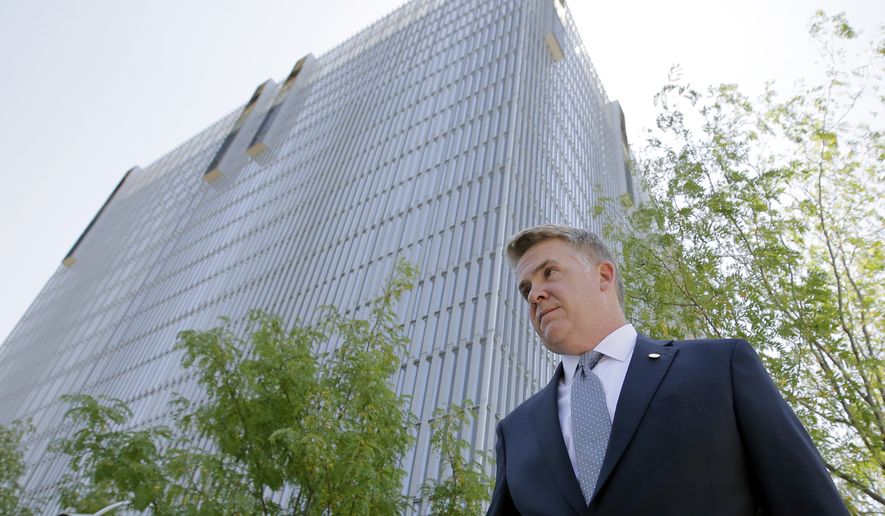Attorney General Jeff Sessions thought he had already answered calls for a special counsel to look into the FBI’s handling of sensitive political investigations when he named a Utah prosecutor to conduct an inquiry and report back.
Nearly 18 months later, there has been nary a public peep from U.S. Attorney John Huber, the man Mr. Sessions assigned to get to the bottom of things.
Likely witnesses say Mr. Huber has never contacted them, and members of Congress say they are still in the dark despite regular pleas to see progress.
“It concerns me that we haven’t heard a darn thing,” Rep. Jim Jordan, Ohio Republican, told The Washington Times last week. “It’s like ’Where’s Waldo?’ ’Where’s Huber?’”
Mr. Huber’s assignment is coming under scrutiny as top Republicans, including President Trump, demand a Justice Department investigation into the way the FBI and Justice Department targeted Mr. Trump’s campaign and his associates in 2016 while looking to give Hillary Clinton a pass on criminal wrongdoing, as Republican lawmakers allege.
When it was revealed last year that the FBI used questionable information to obtain a wiretap of a former Trump campaign adviser, Mr. Sessions faced calls for a special counsel. He rejected those calls, saying he already had asked Mr. Huber to investigate and, with the power to call a grand jury, Mr. Huber was supposed to be every bit as adept as a special counsel.
Mr. Sessions was ousted last year. William P. Barr is now ensconced as head of the Justice Department, yet it’s unclear what that means for Mr. Huber and his secret work.
Legal analysts said he should have produced some evidence of progress after more than a year.
“There should be some proof of life,” said Andrew Leipold, a law professor at the University of Illinois who served as a consultant on special counsel Kenneth W. Starr’s Whitewater investigation.
“We should see people going in and out of his building, people interviewed leaking to the press, or a target calling a press conference,” he said. “The fact that none of that has happened is puzzling.”
Carter Page, the former Trump adviser who was a subject of the Foreign Intelligence Surveillance Act snooping warrant, said he hasn’t heard from Mr. Huber.
He said he is not concerned, but others are frustrated.
Victoria Toensing, a former Justice Department prosecutor and now a private lawyer, represents a whistleblower against the Clinton Foundation. The witness, Doug Campbell, is an FBI informant who says he has evidence that Mrs. Clinton helped a Russian company obtain U.S. uranium rights in exchange for large donations to the foundation, known as the Uranium One scandal.
Although the Uranium One allegations are within Mr. Huber’s purview, Ms. Toensing has heard nothing from him. She has not reached out to Mr. Huber but said he should have contacted her within the first two months of his investigation.
“It is head fake, a farce,” she said of the Huber investigation. “It was an attempt by Sessions to get Republicans off his back. I’m embarrassed for them because they fell for it, and I hope something happens now.”
There have been some tantalizing tidbits of operational data.
Appearing before Congress in November, Justice Department Inspector General Michael Horowitz confirmed that he had “several contacts” with Mr. Huber, but he refused to explain further.
“I think you need to talk to him about what scope and what he’s working on,” he told Mr. Jordan. “I wouldn’t begin to presume I know all of what he is necessarily working on.”
The Justice Department, Mr. Huber’s office and the inspector general declined to comment on the investigation or even confirm whether it is still open.
A spokeswoman for Mr. Sessions also declined to comment.
Former Attorney General Edwin Meese III said the lack of information could be a sign that the investigation is being handled properly.
“I can remember all kinds of investigations that went on in secret when I was attorney general, and properly so,” he said. “The less that is said about an ongoing probe, the better. It is absolutely proper to not speak about a probe until you have an outcome or no announcement at all if there is no indictment.”
Others aren’t convinced by such reasoning and say they want to see more activity.
“The Mueller probe is what a real investigation looks like,” said Tom Fitton, president of Judicial Watch. “There were grand juries, indictments, subpoenas and fights in court. I don’t know why people are putting their hopes in a secret investigation.”
One possibility for the lack of information is that Mr. Huber doesn’t want to upstage the inspector general’s inquiry into some of the same matters.
Yet for some Republicans, only a new special counsel can get to the bottom of things.
Sen. Lindsey Graham, South Carolina Republican and chairman of the Senate Judiciary Committee, is among those calling on Mr. Barr to name such a special counsel.
Mr. Graham told The Times that he has not received any updates from Mr. Huber but doesn’t intend to call him before the Senate. He said he would defer to Mr. Barr on how to handle that investigation.
“I want to give Barr a chance to set it up the way he wants to,” Mr. Graham said.
Mr. Meese disagreed. He said the Justice Department’s public integrity section or Mr. Horowitz should investigate the allegations.
“This should be handled by the regular personnel at the Justice Department who are dedicated to handling things like this,” he said. “There is no reason to have a special counsel as such because it only confuses things. You have to do things like set up new procedures and hire lawyers from the outside.”
• Jeff Mordock can be reached at jmordock@washingtontimes.com.




Please read our comment policy before commenting.